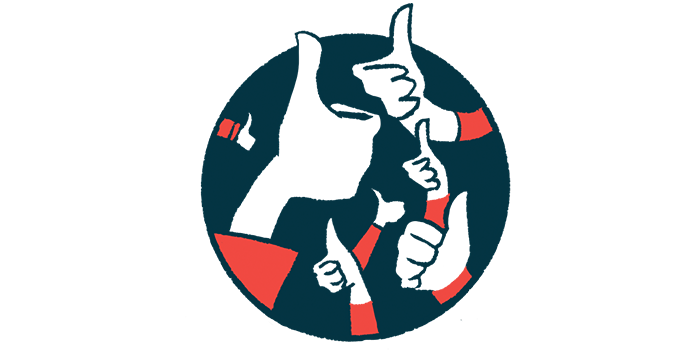Ultomiris approved in EU for adults with AQP4-positive NMOSD
Treatment is being considered for approval for the condition in the US and Japan
Written by |

Ultomiris (ravulizumab) has been approved by the European Commission to treat adults with neuromyelitis optica spectrum disorder (NMOSD) who test positive for antibodies against aquaporin-4 (AQP4).
“Effective NMOSD management hinges on reducing relapses – even a single relapse may cause irreversible disabilities leaving patients unable to move, speak or care for themselves,” Orhan Aktas, MD, a professor at Heinrich-Heine-University in Düsseldorf, Germany, said in a press release from AstraZeneca, which markets Ultomiris. “This approval in Europe will offer patients and physicians a new, long-acting treatment with unmatched relapse risk reduction, as Ultomiris showed zero relapses in its pivotal trial with dosing every eight weeks.”
About 5,000 adults in the European Union (EU) have NMOSD, according to AstraZeneca.
Health authorities in each EU member state, as well as in Iceland, Norway, and Liechtenstein, will now decide whether to add Ultomiris to the list of medications NMOSD patients can access at low or not cost through their respective public health programs.
The decision comes barely a month after the therapy received a positive opinion from the European Medicines Agency’s Committee for Medicinal Products for Human Use (CHMP). Ultomiris is being considered for approval for NMOSD in the U.S. and Japan.
The therapy was developed by Alexion Pharmaceuticals before being acquired in 2021 by AstraZeneca and is now known as Alexion, AstraZeneca Rare Disease. It’s designed to block the activation of the complement cascade, a part of the immune system that plays a key role in the inflammatory attack that drives NMOSD.
Ultomiris vs. Soliris
Ultomiris works in virtually the same way as Soliris (eculizumab), an older therapy developed by Alexion that in 2019 became the first approved treatment for patients with anti-AQP4 antibodies, the most common type of NMOSD-driving antibody.
Both medications are administered via infusion into the bloodstream, but Ultomiris was made to be more stable than Soliris, allowing less frequent dosing. Whereas Soliris is given every other week, Ultomiris is administered every eight weeks after a loading dose.
The second-generation therapy was already approved in Europe, the U.S., and Japan for other rare diseases driven by complement cascade overactivation, including generalized myasthenia gravis, atypical hemolytic uremic syndrome, and paroxysmal nocturnal hemoglobinuria.
Results of CHAMPION study
The European Commission’s approval of Ultomiris for the new indication was based on data from the Phase 3 CHAMPION-NMOSD clinical trial (NCT04201262), which enrolled 58 adults with NMOSD and antibodies against AQP4. All were treated with Ultomiris.
The results, published in March, showed, over a median follow-up of nearly 1.5 years, no participants on Ultomiris had an NMOSD disease relapse. As a comparison, 20 (42.6%) of the 47 patients given a placebo in a previous Soliris trial had a relapse over a median of eight months of follow up.
In addition, nearly all Ultomiris-treated patients (96.6%) were free from clinically-relevant worsening in walking over the follow-up versus three-quarters (76.6%) of those on a placebo in the previous Soliris trial.
Safety data from the CHAMPION-NMOSD study were generally consistent with previous clinical and real-world studies of Ultomiris. No new safety concerns were identified.
Most commonly reported side effects included headache, joint and back pain, and urinary tract infections. Three serious infections were deemed related to the immunosuppressive therapy. COVID-19 infections also were common during the study, which launched in late 2019, but none were serious or deemed related to Ultomiris, according to AstraZeneca.
“Just four years since delivering the first approved NMOSD treatment to the EU, we are pleased to once again advance the treatment landscape with Ultomiris, which may eliminate relapses for people impacted by NMOSD,” said Marc Dunoyer, CEO of Alexion, AstraZeneca Rare Disease. “This approval is the culmination of extensive work and collaboration with the NMOSD community, including patients, caregivers, and healthcare providers who participated in the CHAMPION-NMOSD trial, and we’re proud to continue improving access to our innovative medicines worldwide.”





